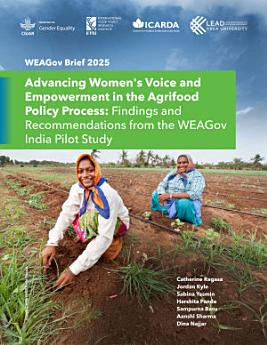Advancing women's voice and empowerment in the agrifood policy process: Findings and recommendations from the WEAGov India Pilot Study
Ragasa, Catherine · Kyle, Jordan · Yasmin, Sabina · Pande, Harshita · Basu, Sampurna · Sharma, Aanshi · Najjar, Dina
Feb 2025 · Intl Food Policy Res Inst
Ebook
17
Pages
family_home
Eligible
info
reportRatings and reviews aren’t verified Learn More
About this ebook
Women’s equal participation and leadership in political and public life can boost a country’s long-run economic growth, foster social inclusion, and help countries reach the 2030 Sustainable Development Goals. Beyond these important outcomes, women’s inclusion in public life is a basic human right: women deserve a role in making decisions, controlling resources, and shaping policies. Yet, globally, only 22 percent of members of parliament and 16 percent of cabinet secretaries are women. Although disproportionately employed in the agrifood system, women lack decision-making power regarding the policies that govern it. And beyond high-level statistics like the share of women in national parliaments, there is a lack of tools for measuring and tracking gender equality in national- and state-level governance (ElDidi et al., 2021; Quisumbing et al., 2023; Ragasa et al., 2022). Yet, achieving meaningful progress on gender equality within governance requires identifying specific gaps and opportunities within a country’s policy process.
Rate this ebook
Tell us what you think.
Reading information
Smartphones and tablets
Install the Google Play Books app for Android and iPad/iPhone. It syncs automatically with your account and allows you to read online or offline wherever you are.
Laptops and computers
You can listen to audiobooks purchased on Google Play using your computer's web browser.
eReaders and other devices
To read on e-ink devices like Kobo eReaders, you'll need to download a file and transfer it to your device. Follow the detailed Help Center instructions to transfer the files to supported eReaders.




